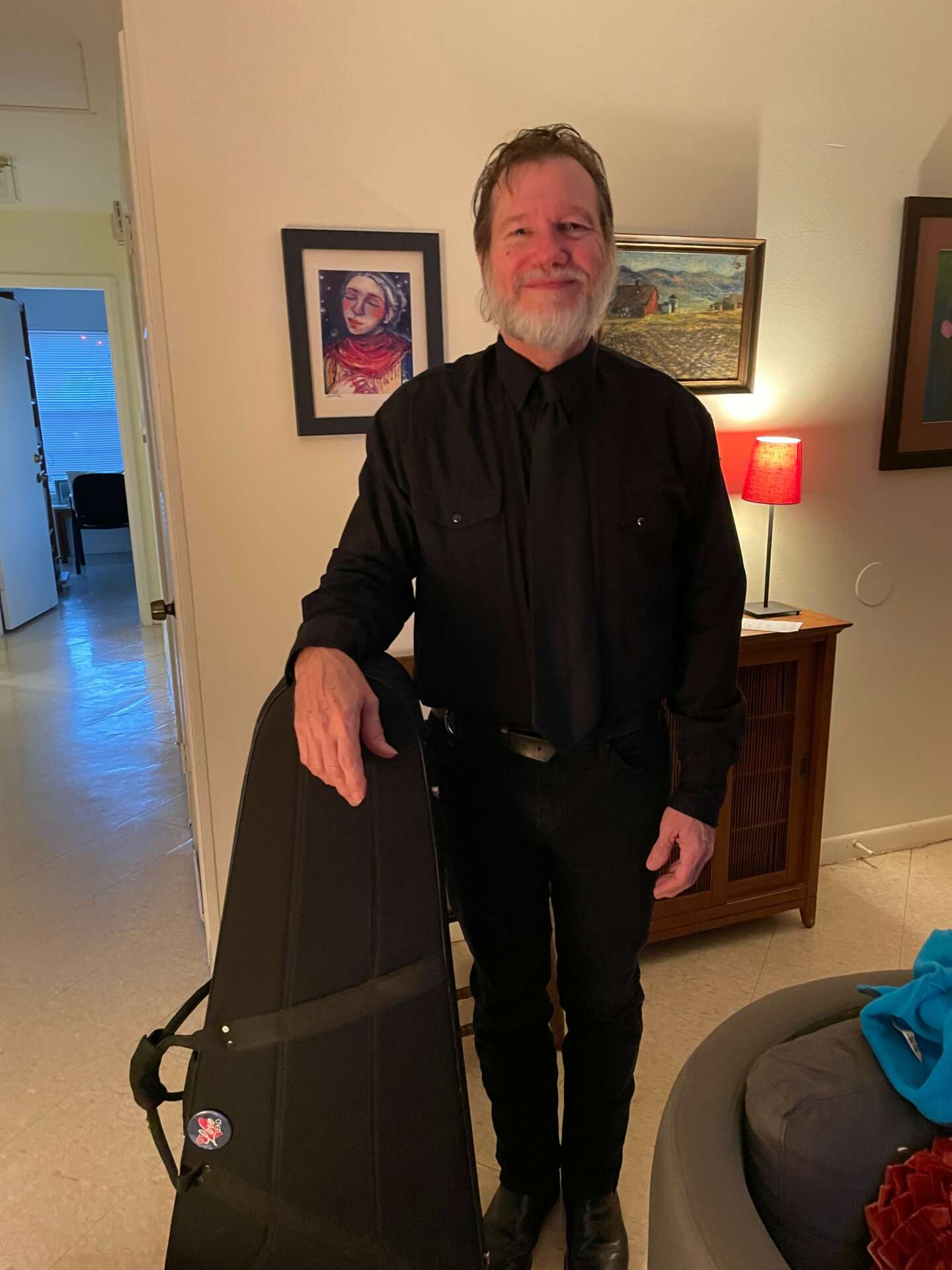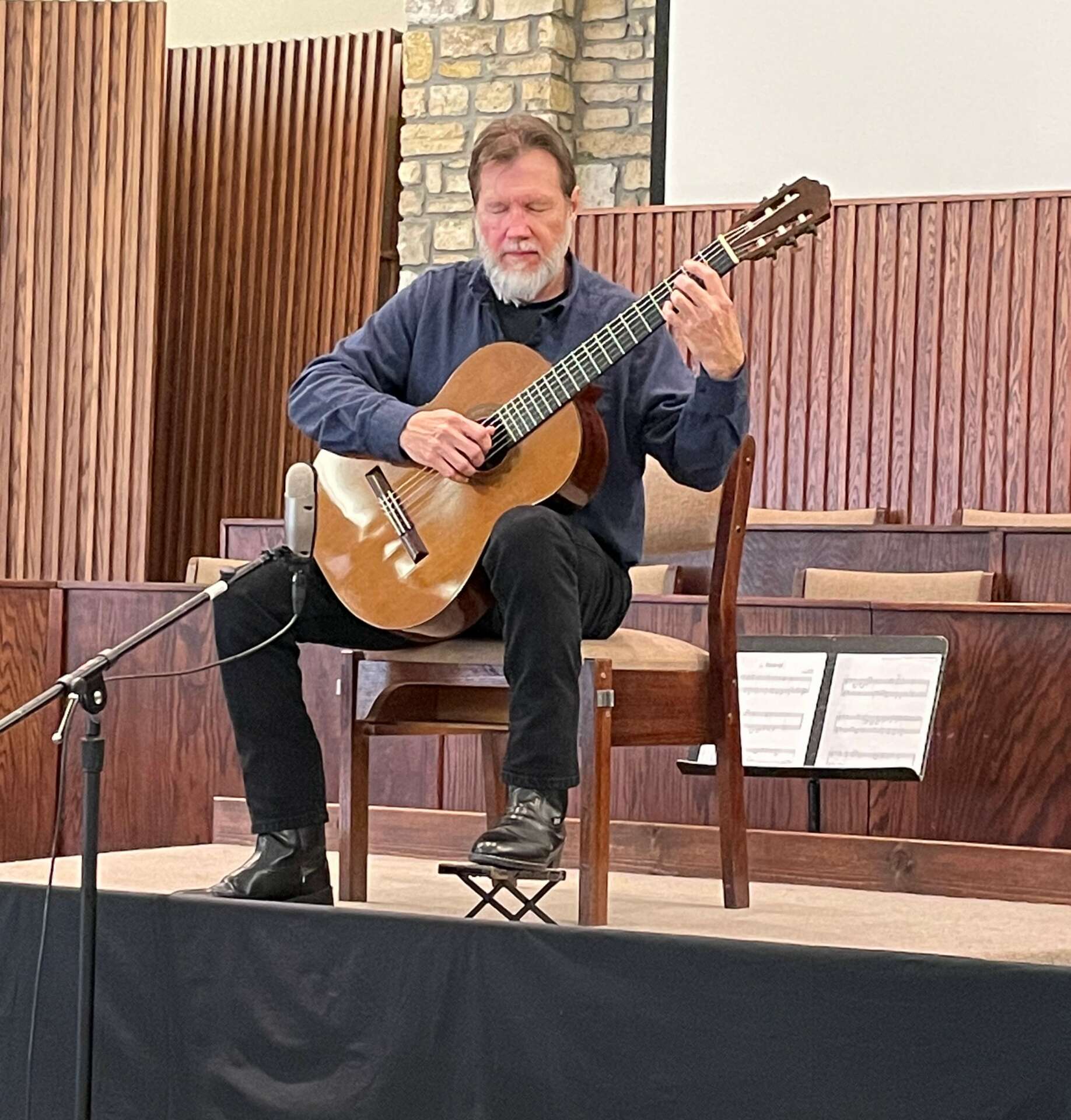We’re excited to introduce you to the always interesting and insightful Robert Harding. We hope you’ll enjoy our conversation with Robert below.
Alright, Robert thanks for taking the time to share your stories and insights with us today. What’s the kindest thing anyone has ever done for you?
I’ll answer this question in relation to what I do creatively, which is to play music. These days I am more often on a stage with a listening audience, but in the early years of playing professionally I played all those “paying-your-dues” gigs. There have been times where I was not getting any response from the people in the room. Like in a coffee house because they aren’t present necessarily to listen to music. There have been other gigs where, volume wise, I was being overpowered by vocal chatter to the point you can’t hear yourself play. I have, at some of those times wondered why I do it at all. Yet, like everyone else who does that sort of thing, I keep on playing.
The issue is that playing is a sharing effort and in the worst playing situations you can feel like you are alone in a practice room. Fortunately, kindness can restore the sense of community around music making.
The kindest thing anyone has done for me was making it a point to tell me they were listening, and that they wanted to thank me for playing. The comments were said with empathy for my situation, and that I might need a little bolstering, or encouragement. That is kindness, and kindness inspires me.

Robert, before we move on to more of these sorts of questions, can you take some time to bring our readers up to speed on you and what you do?
I am a guy who has had a lifelong love of music and fell in love with playing the guitar in high school. This positively influenced the course of my life and has yielded many blessings I may not have enjoyed otherwise. I share music by playing it live.
As a young child, I remember notes on the piano corresponding to vivid color resonance as I played notes up and down the keyboard. Around kindergarten age I remember playing in the dirt while hearing The Beatles song “Help” in my head, adding parts to it in my internal playback. At 16 I learned banjo from my dad, who taught me clawhammer style, an old Appalachian technique and sound.
However, a year later my Dad and I were at a small music store in Richardson, Texas picking out a steel string guitar. I took lessons, got a couple of electric guitars, jammed with everyone I could, and played in a rock and roll band in front of people. I was hooked.
When I was a 17 year old listening to Segovia records (20th century Spanish classical guitarist), I heard music that took me places, that made me feel relaxed and focused at the same time. That’s a pretty calming effect to a 17 year old, but I continued to play the electric guitar.
After high school I went to San Antonio to study guitar at a conservatory, and that’s where I began studying classical guitar. I was drawn to the idea of playing the music on the page and making it sound like I heard it in my head. So, I went to college and earned my Bachelor of Music from UNT, and my Master of Music from SMU. Both are performance degrees on classical guitar. I traveled to Spain one summer to study guitar in Madrid and Alacante. I met a wealth of unforgettable, great musicians, composers, song writers, and artists from all over the globe. For several years, whenever a concertizing guitarist gave a master class in Dallas, I played as a student.
As a student at SMU, I once played music for a dinner inside the Meadows Art Museum where the playwright Arthur Miller was the guest of honor. Afterwards we all walked next door to watch the theater department present his play “The Crucible”. I bet those actors were more nervous that night than I was.
I was a college professor of music for several years, and released a recording in 2007. I’ve played professionally everywhere from concert halls to airline cabins in flight. From live radio to an event at a smelly recycling plant on a plank board stage.
The guitar affords an intimate listening experience. Playing to one person or a small group of friends is as rewarding as playing in a hall full of people. When the weather permits, I love performing outdoors in nature. The sounds of the wind and birds can add to the overall experiences for both myself and the listeners. I love telling listeners information about the piece I am about to play. People tell me it helps them listen with some context.
My success is tied to my love of the music and my persistence in playing it throughout my life. I’ve honored those initial feelings that attracted me to music, and later to playing music on guitar, for those were born in innocence. Today I play for the same reasons that drew me to the guitar in the first place. I remember why I wanted to play. And these are still very good feelings.
Do you think there is something that non-creatives might struggle to understand about your journey as a creative? Maybe you can shed some light?
I think this is a good question because it illuminates the perceived separation creative/ non creative. I know in my heart that there is no separation. Each of us, in our jobs and life employ creativity to help ameliorate challenges. The options to any challenge are created within the perceived limitations of whatever. A budget, for example.
Most of engineering is creative within the physical boundaries defined by nature. In the same way a composer who orchestrates a piece of music is bound by the limitations and qualities of those instruments.
I am chiefly an interpreter, like a concert pianist, but on nylon string guitar. I believe that interpreting is a creative act, and shares the need for creativity within the limitations and qualities of the guitar I am playing. A lot of activity sometimes occurs in the textures of many pieces I play.
The challenge can be ‘how can each voice be clear and independent?’, and deciding how to do that technically requires creativity within the limits of the guitar being played.
Sometimes a third string can be a little louder, naturally than the second and first. If the passage in question also has voices being played on the third and second strings, then the right hand has to pluck those two strings a little lighter than the second string. Or, the guitar can perhaps adjusted at a shop to equalize that imbalance in volume. Or, a different brand of strings can sometimes help. I have to create a mindset to be able to see the options.
In this way my creative journey is not unlike any other vocation or occupation. I do think there is one thing people who don’t play music might struggle with understanding about my creative journey. Appreciating the joy I get when thinking about guitar nerd stuff like which fingering works best for a passage, or sometimes how to play just one chord. I am happy for hours thinking about that kind of stuff.
I get excited about the idea of the sound of my instrument. That sort of personal stuff about how I play might be a struggle to understand, or even regard for someone who simply isn’t interested. And, I know there are aspects of their lives I would’t necessarily regard beyond wishing them the best. In this way too we all illuminate how “creatives and non-creatives” is a perceived separation. We are all creative.

For you, what’s the most rewarding aspect of being a creative?
Continuing to play the guitar and sharing my joy for its sound with anyone who will listen is rewarding for me. And, knowing there is a possibility that the music I play can help someone simply relax is the most rewarding. The calming nature of that experience seems very important these days.
Contact Info:
- Facebook: https://www.facebook.com/RobertHardingGuitarist
- Youtube: https://www.youtube.com/user/rguitarharding/videos


